
The Market for Corporate Law 第七组: 车心怡 PART I,PARTIN 刘玉涛 PART III 李天虹PARTIV 627r20 azienka cesdwe
Page 1 第七组: 车心怡 PART I, PART II 刘玉涛 PART III 李天虹 PART IV

PART I An Interest-Group Analysis of Delaware Corporate Law 车心怡 Page 2
Page 2 车心怡
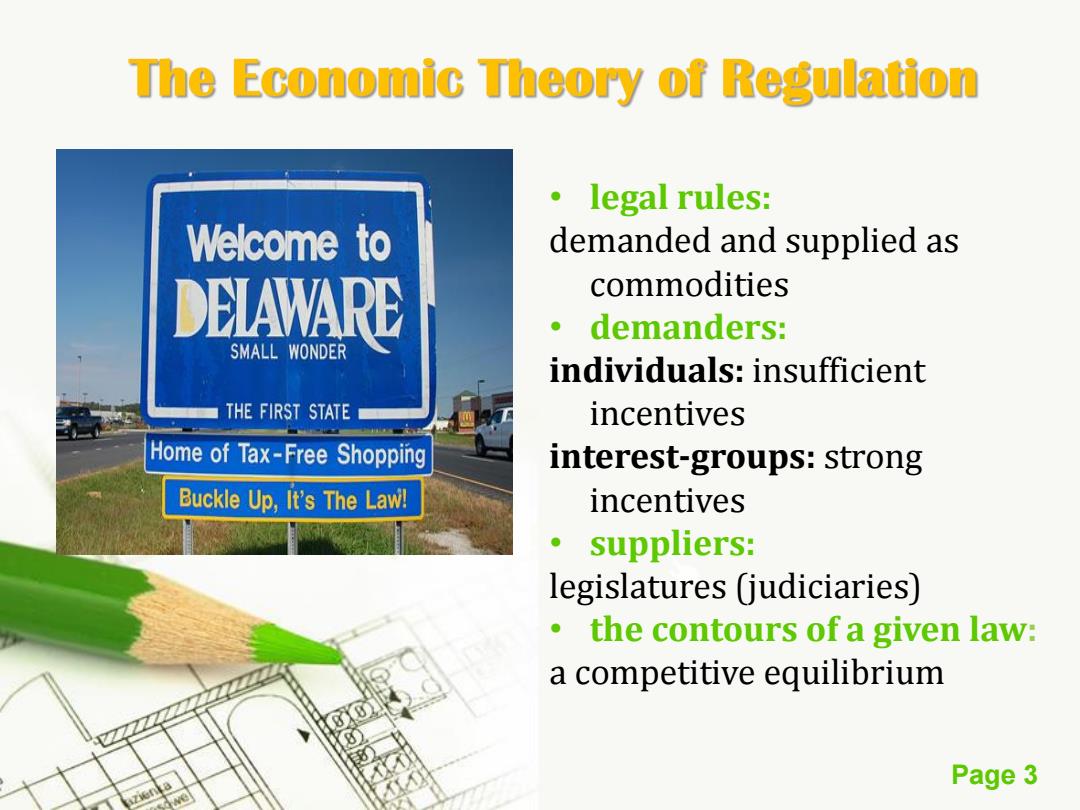
The Economic Theory of Regulation legal rules: Welcome to demanded and supplied as DELAWARE commodities demanders: SMALL WONDER individuals:insufficient THE FIRST STATE incentives Home of Tax-Free Shopping interest-groups:strong Buckle Up,It's The Law! incentives suppliers: legislatures (judiciaries) 0 the contours of a given law: a competitive equilibrium Page 3
Page 3 • legal rules: demanded and supplied as commodities • demanders: individuals: insufficient incentives interest-groups: strong incentives • suppliers: legislatures (judiciaries) • the contours of a given law: a competitive equilibrium
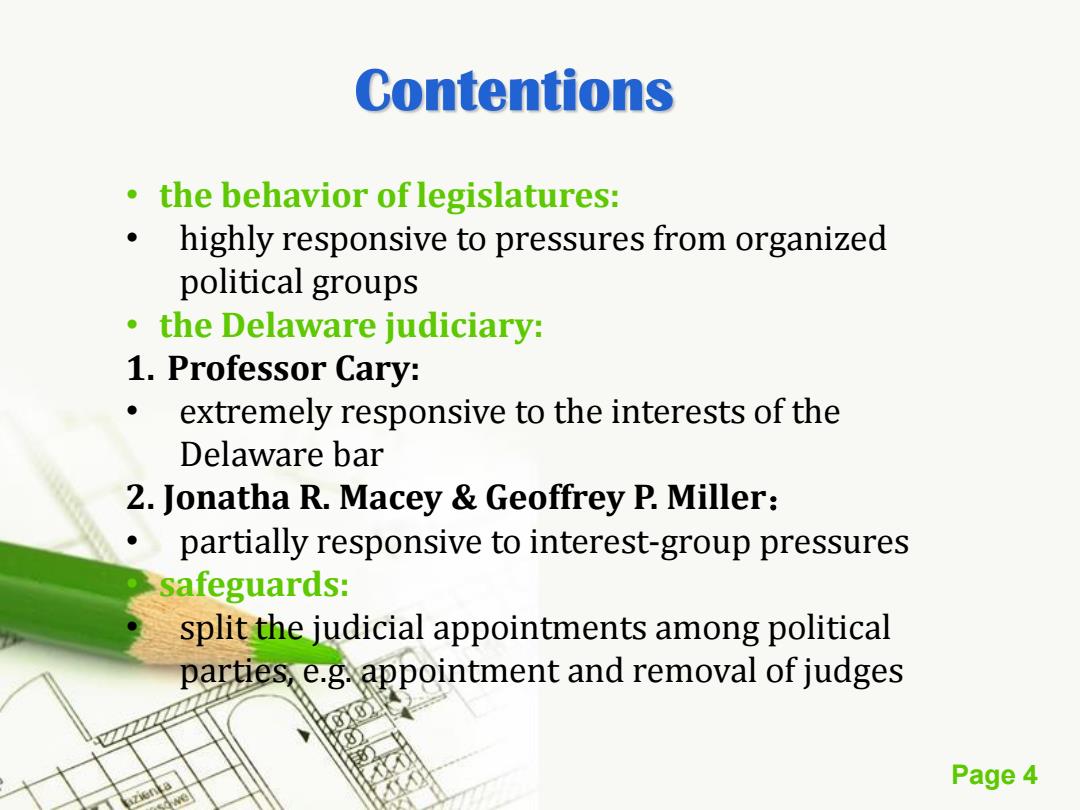
Contentions the behavior of legislatures: highly responsive to pressures from organized political groups the Delaware judiciary: 1.Professor Cary: extremely responsive to the interests of the Delaware bar 2.Jonatha R.Macey Geoffrey P.Miller: partially responsive to interest-group pressures safeguards: split the judicial appointments among political parties,e.g.appointment and removal of judges Page 4
Page 4 • the behavior of legislatures: • highly responsive to pressures from organized political groups • the Delaware judiciary: 1. Professor Cary: • extremely responsive to the interests of the Delaware bar 2. Jonatha R. Macey & Geoffrey P. Miller: • partially responsive to interest-group pressures • safeguards: • split the judicial appointments among political parties, e.g. appointment and removal of judges
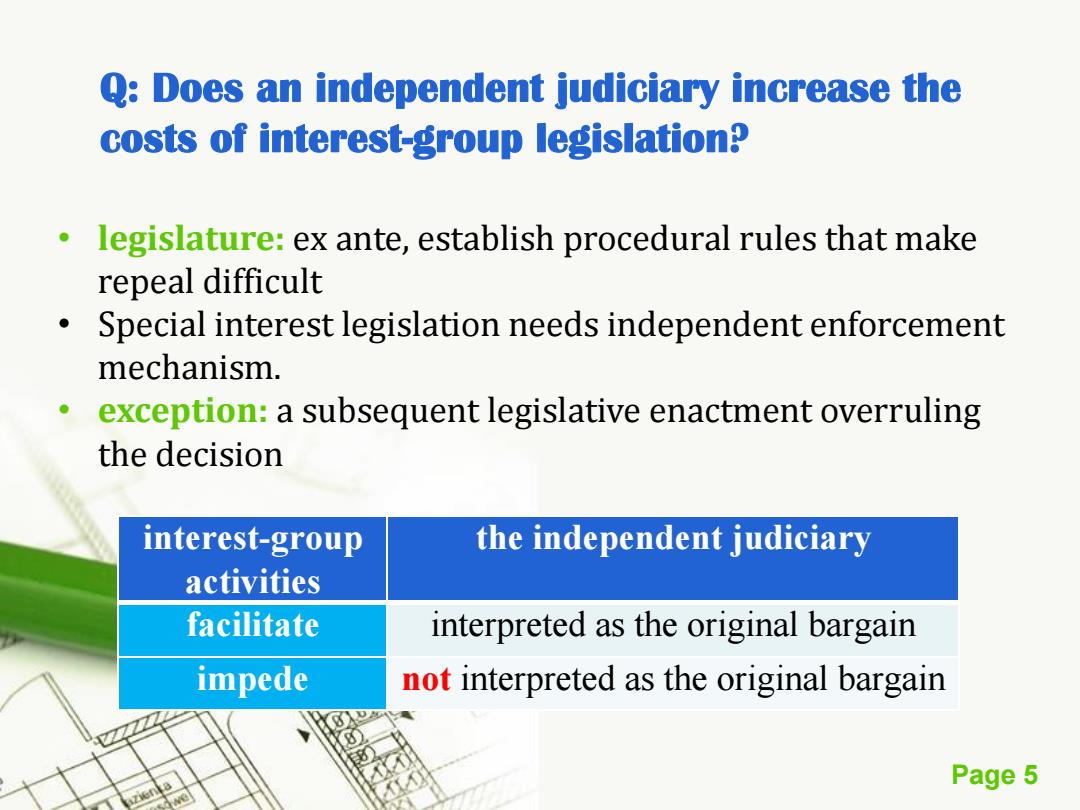
Q:Does an independent judiciary increase the costs of interest-group legislation? legislature:ex ante,establish procedural rules that make repeal difficult Special interest legislation needs independent enforcement mechanism. exception:a subsequent legislative enactment overruling the decision interest-group the independent judiciary activities facilitate interpreted as the original bargain impede not interpreted as the original bargain Page 5
Page 5 Q: Does an independent judiciary increase the costs of interest-group legislation? • legislature: ex ante, establish procedural rules that make repeal difficult • Special interest legislation needs independent enforcement mechanism. • exception: a subsequent legislative enactment overruling the decision interest-group activities the independent judiciary facilitate interpreted as the original bargain impede not interpreted as the original bargain
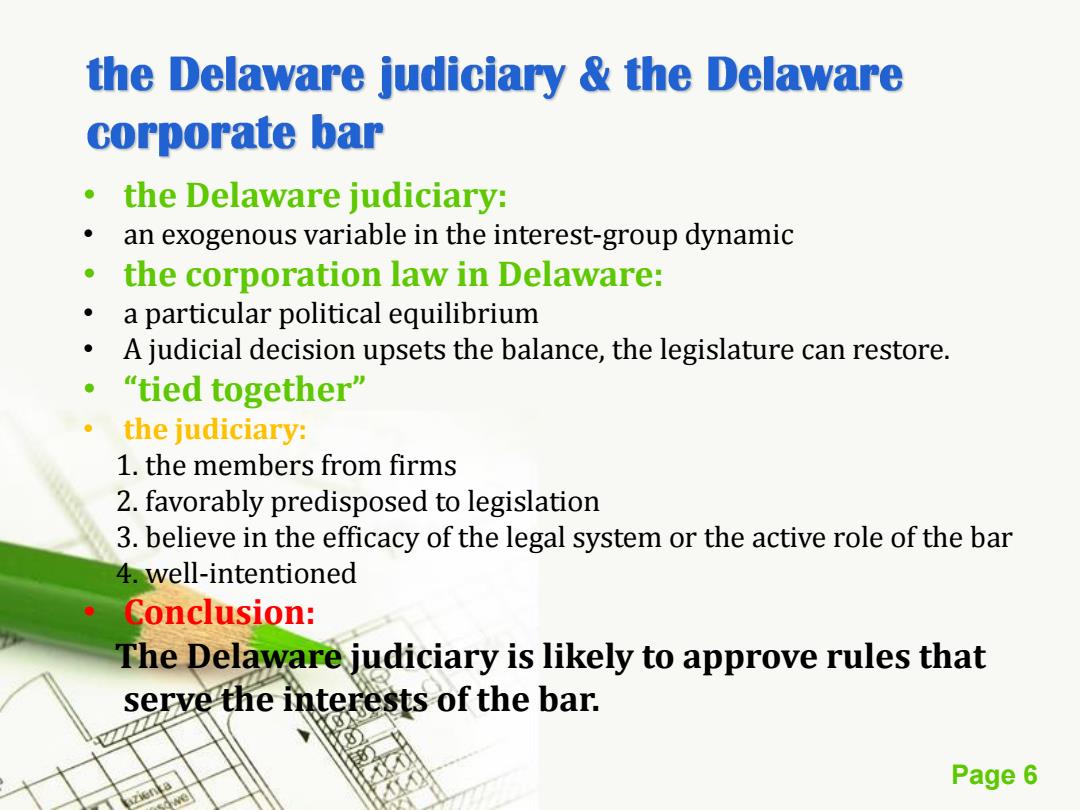
the Delaware judiciary the Delaware corporate bar the Delaware judiciary: an exogenous variable in the interest-group dynamic the corporation law in Delaware: a particular political equilibrium A judicial decision upsets the balance,the legislature can restore. “tied together” the judiciary: 1.the members from firms 2.favorably predisposed to legislation 3.believe in the efficacy of the legal system or the active role of the bar 4.well-intentioned Conclusion: The Delaware judiciary is likely to approve rules that serve the interests of the bar. Page 6
Page 6 • the Delaware judiciary: • an exogenous variable in the interest-group dynamic • the corporation law in Delaware: • a particular political equilibrium • A judicial decision upsets the balance, the legislature can restore. • “tied together” • the judiciary: 1. the members from firms 2. favorably predisposed to legislation 3. believe in the efficacy of the legal system or the active role of the bar 4. well-intentioned • Conclusion: The Delaware judiciary is likely to approve rules that serve the interests of the bar
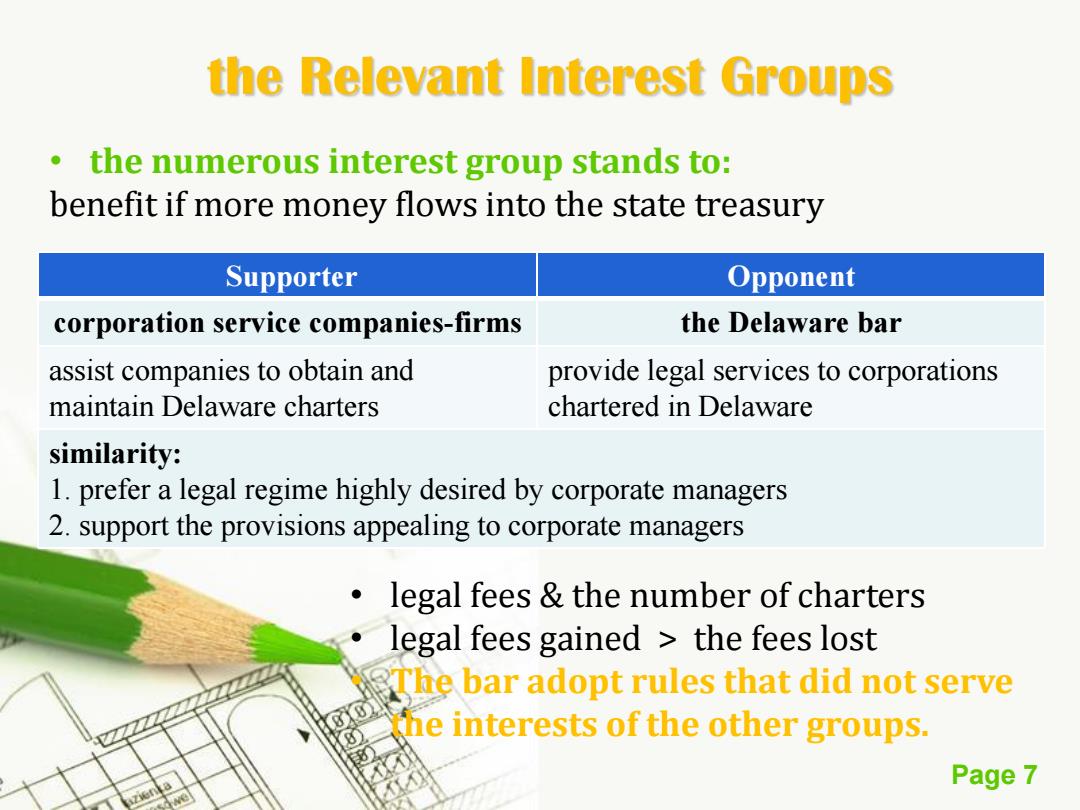
the Relevant Interest Groups the numerous interest group stands to: benefit if more money flows into the state treasury Supporter Opponent corporation service companies-firms the Delaware bar assist companies to obtain and provide legal services to corporations maintain Delaware charters chartered in Delaware similarity: 1.prefer a legal regime highly desired by corporate managers 2.support the provisions appealing to corporate managers legal fees the number of charters legal fees gained the fees lost The bar adopt rules that did not serve he interests of the other groups. Page 7
Page 7 • the numerous interest group stands to: benefit if more money flows into the state treasury Supporter Opponent corporation service companies-firms the Delaware bar assist companies to obtain and maintain Delaware charters provide legal services to corporations chartered in Delaware similarity: 1. prefer a legal regime highly desired by corporate managers 2. support the provisions appealing to corporate managers • legal fees & the number of charters • legal fees gained > the fees lost • The bar adopt rules that did not serve the interests of the other groups
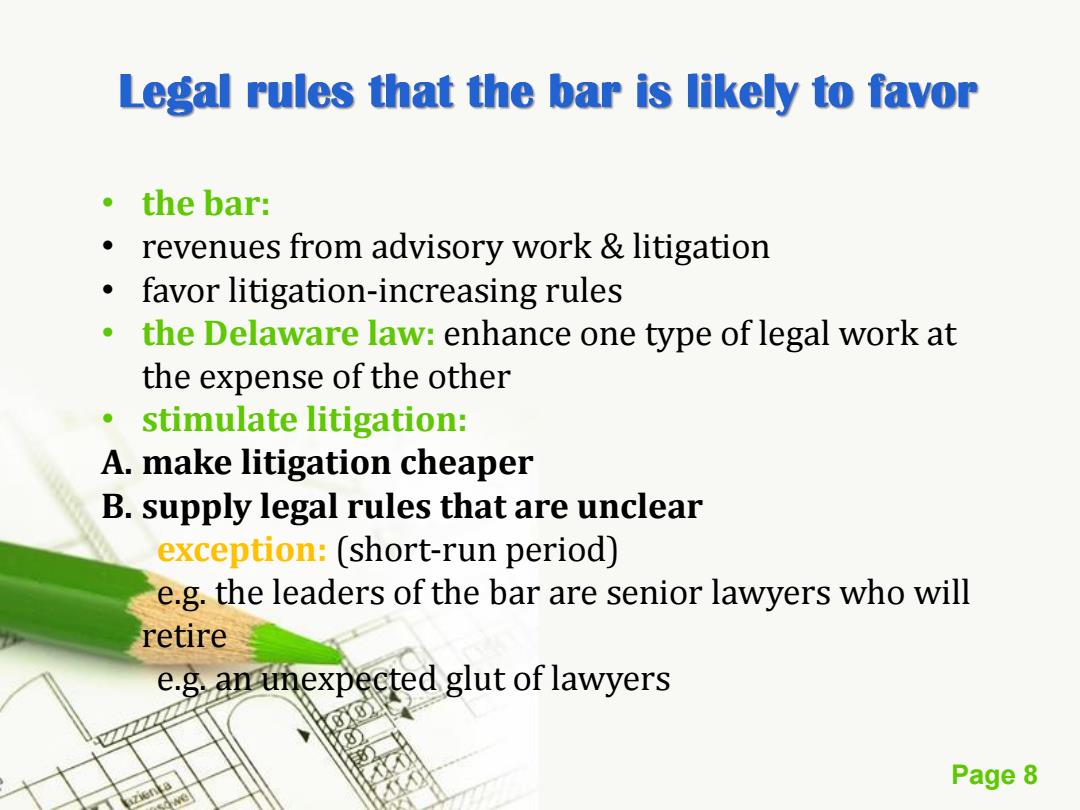
Legal rules that the bar is likely to favor the bar: revenues from advisory work litigation favor litigation-increasing rules 0 the Delaware law:enhance one type of legal work at the expense of the other stimulate litigation: A.make litigation cheaper B.supply legal rules that are unclear exception:(short-run period) e.g.the leaders of the bar are senior lawyers who will retire e.g an unexpected glut of lawyers Page 8
Page 8 • the bar: • revenues from advisory work & litigation • favor litigation-increasing rules • the Delaware law: enhance one type of legal work at the expense of the other • stimulate litigation: A. make litigation cheaper B. supply legal rules that are unclear exception: (short-run period) e.g. the leaders of the bar are senior lawyers who will retire e.g. an unexpected glut of lawyers

PART II Race to the Top Race to the Bottom 车心怡 Page 9
Page 9 车心怡
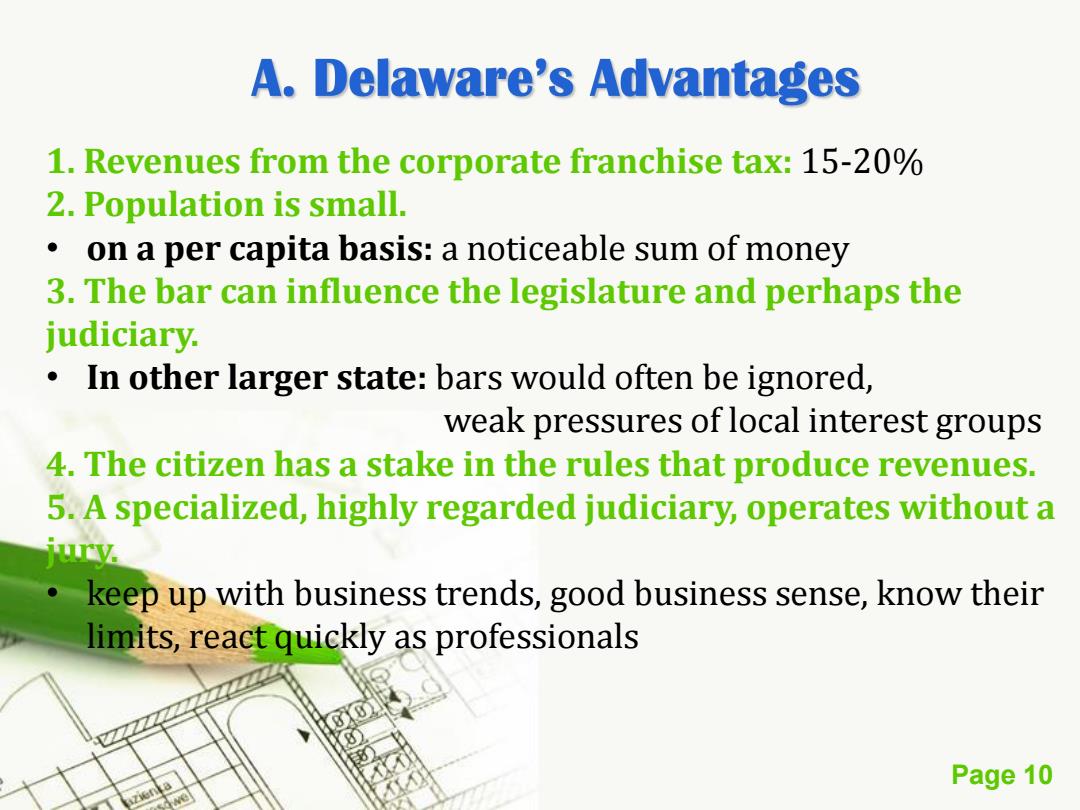
A.Delaware's Advantages 1.Revenues from the corporate franchise tax:15-20% 2.Population is small. on a per capita basis:a noticeable sum of money 3.The bar can influence the legislature and perhaps the judiciary. In other larger state:bars would often be ignored, weak pressures of local interest groups 4.The citizen has a stake in the rules that produce revenues. 5.A specialized,highly regarded judiciary,operates without a urV keep up with business trends,good business sense,know their limits,react quickly as professionals Page 10
Page 10 1. Revenues from the corporate franchise tax: 15-20% 2. Population is small. • on a per capita basis: a noticeable sum of money 3. The bar can influence the legislature and perhaps the judiciary. • In other larger state: bars would often be ignored, weak pressures of local interest groups 4. The citizen has a stake in the rules that produce revenues. 5. A specialized, highly regarded judiciary, operates without a jury. • keep up with business trends, good business sense, know their limits, react quickly as professionals